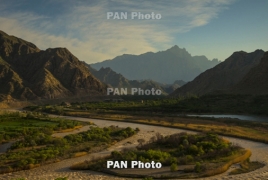Expert: Regional tensions serve to maximize pressure on Armenia July 20, 2021 - 17:47 AMT PanARMENIAN.Net - Current tensions on the Armenian-Azerbaijani border serve to maximize pressure on Armenia, according to South Caucasus expert Laurence Broers. He believes the situation is also aimed at reminding Russia of its obligations, keeping Azerbaijan mobilized around the axis of the conflict and keep the focus off discourses of Nagorno-Karabakh's self-determination. The assessment comes amid growing tensions on the Armenian-Azerbaijani border. In the past 24 hours, the Azerbaijani military has opened fire on Armenian positions and near civilian settlements in three provinces: Syunik, Gegharkunik and Ararat. The head of Yeraskh community in Ararat was wounded late on July 19. Broers said Azerbaijani social media have suggested reports of advances by Azerbaijani forces, if true, likely in the no man’s lands. Local Armenian community head in Yeraskh Radik Oghikyan was wounded by Azerbaijani fire, on the same day that Azerbaijani President Ilham Aliyev is meeting Russian leader Vladimir Putin in Moscow to discuss the implementation of Armenia-Azerbaijan agreements so far. The expert believes that the reason that ceasefire violations continue to happen despite the ceasefire agreement is that Baku is seeking to avoid a repeat of the 1990s – where the militarily victorious side, then Armenia, was not able to consolidate its victory into a favorable peace from a position of strength. "Azerbaijan is consequently seeking to maximise pressure on Armenia to force it into a comprehensive peace agreement, for which – from Baku’s perspective – there will never be a better time than now," Broers said in a tweet. "Tensions also put pressure on Russia to ‘deliver’ on agreements reached so far, especially on what Azerbaijan refers to as the “Zangezur corridor”, a right of safe transit across Armenia’s southernmost Syunik region conceded by [acting Armenian Prime Minister] Nikol Pashinyan" in a statement signed on November 9, 2020. Broers argues, however, that the opening up of regional connectivity will remain illusory for as long as coercive bargaining tactics prevail. Beyond military pressure, Azerbaijan is pressuring Armenia with purported claims on Syunik, the expert said. "The logic seems to be “two can play at that game” and aims at establishing parity between Karabakh and Zangezur as contested spaces and a quid pro quo dynamic: if Armenia “renounces” Karabakh, Azerbaijan will “renounce” Zangezur," he wrote. "Contesting Armenia’s territorial integrity also shapes perceptions of what is actually in conflict, keeping the focus on the inter-state dimension, plus the regulation of borders between Armenia and Azerbaijan, rather than the governance of majority-minority relations within the same state. Current tensions therefore serve to maximise pressure on Armenia, remind Russia of its obligations, keep Azerbaijan mobilised around the axis of the conflict and keep the focus off discourses of self-determination." Six total incidents have burned 19 old-growth trees. Friday night 8 trees were torched along the beautiful main entrance. The EU does not intend to conduct military exercises with Armenia, Lead Spokesperson for EU Foreign Affairs and Security Policy Peter Stano says. Hikmet Hajiyev has said that there is no place for USAID operation in Azerbaijan any longer. A telephone conversation between Putin and Pashinyan before the CSTO summit is not planned, Peskov says. Partner news |